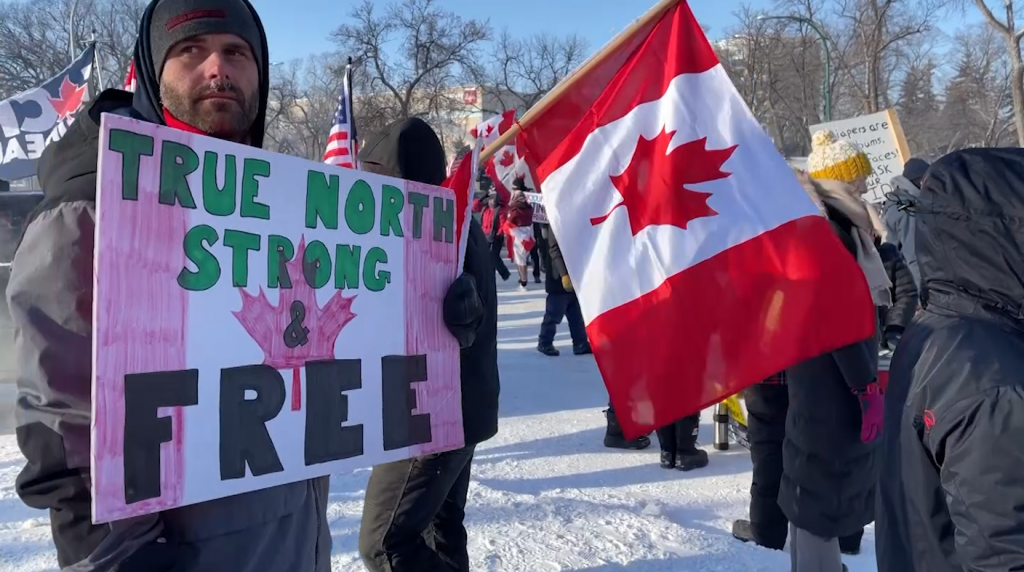Protesters outside Manitoba legislature say they will comply with police order

A protest in front of the Manitoba legislature against COVID-19 restrictions started winding down Wednesday, hours before a deadline issued by police.
Some vehicles that had occupied a block of Memorial Boulevard, just outside the main entrance to the legislature grounds, left the area after almost three weeks.
“We weren’t surprised. We knew it was an eventuality. We knew that we would have a situation like we would in Ottawa where we could refuse or we could comply, and as an organizing team we had agreed early on that we would comply,” said Caleb Brown, a co-organizer of the protest.
Advertisement
“We think that our voice has gotten out there, but there’s more work to do.”
Brown said the protest would continue on a smaller scale, without vehicles, in Memorial Park, an adjacent block of green space.
“We’ll start setting up a little bit of infrastructure in the park to be able to still feed people and host.”
On Wednesday morning, a few protesters were seen cleaning up the street.
Two men moved fire barrels, wood and tables to the nearby park. A small collection of signs in favour of “mandate freedom” remained at an intersection near where the vehicles had been parked.
Advertisement
The protesters had demanded a conversation with Prime Minister Justin Trudeau, which did not take place, and an end to all COVID-19 vaccine mandates.
Winnipeg police issued an ultimatum Tuesday that said protesters could face charges or have their vehicles and other assets seized if they did not remove all vehicles by 5 p.m. Wednesday.
Brown said the protest has always been peaceful, although Winnipeg Mayor Brian Bowman and others have said the occupation of the street and blaring of horns were harmful to area residents. At least one truck was equipped with a train horn.
For many days, a row of trucks and farm equipment blocked the main road entrance to the legislature grounds. Staff in the building were told to work from home if possible.
Police defended their handling of the three-week-long protest Wednesday and said a patient approach had resulted in no serious incidents.
Advertisement
“We’ve used the same set of tactics and overall strategy that we have employed at many demonstrations, which is one of liaising with the people involved and attempting to negotiate, and we’ve been successful with that,” said Const. Rob Carver, a spokesperson for the Winnipeg Police Service.
He said officers who have been monitoring the protest have reported that those involved have been peaceful.
“I’ve personally spoken to many of those officers who have said, consistently, the same message _ that this is one of the most reasonable and most welcoming group of protesters they’ve ever encountered.”
Carver indicated police would allow the demonstration to continue in Memorial Park. He said police have allowed previous protests to continue, as long as they do not disrupt people’s lives or street traffic.
One supporter who identified himself by his spirit name, Rainbow, said it was important for the group to continue offering a space for people to come share their thoughts and views in a safe and respectable manner while honouring the notice from police.
Advertisement
“Whether or not we agree with it, whether or not anyone else in the community agrees with it, we still have to respond in a good way,” he said.
“The truckers really started to bridge a larger communication avenue that’s got the world watching and responding, so I think it’s important now that if we respond where something de-escalates and creates those communication avenues.”
The Manitoba government has already announced plans to lift almost all of its pandemic restrictions. On Tuesday, public venues will no longer be required to ask patrons for proof of vaccination. Masks indoors will no longer be mandatory as of March 15, with the possible exception of long-term care homes.
Manitoba’s COVID-19 indicators have improved in the last couple of weeks. There are fewer people in hospital with the virus, although the number of people in intensive care, while down from a recent peak, is still well above the province’s pre-pandemic capacity.
